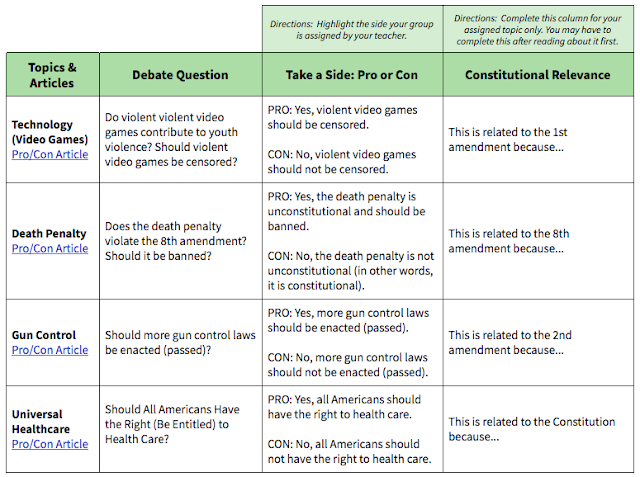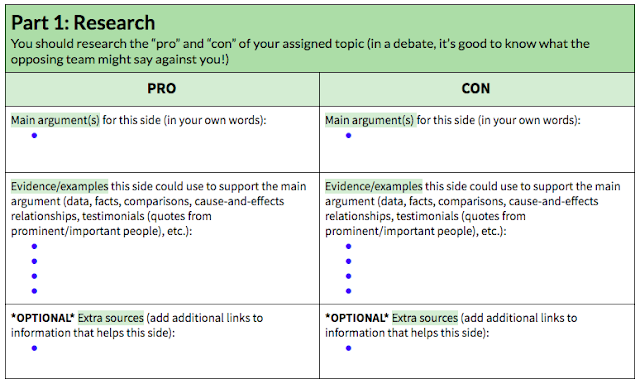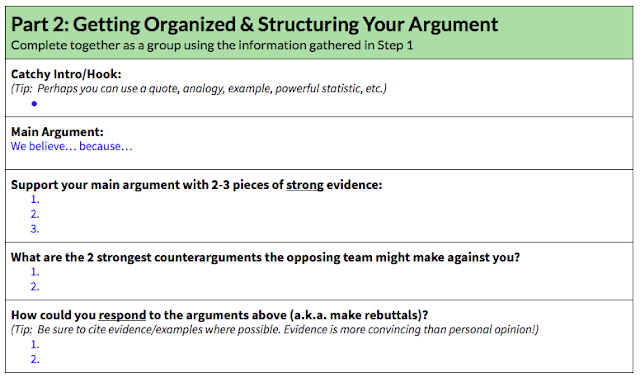Why discourse?
I always found that there weren't enough opportunities for students to practice discourse in the classroom. Yes, students were able to voice their thoughts and ideas, but students did not always have to defend their beliefs or were not given the opportunity or safe space to freely discuss opposing thoughts and ideas. This was concerning to be me because a goal of mine is to teach my students to be global citizens and be engaged and participate in civics as they soon become adults. I want my students to be able to stand by their beliefs, supported by facts, and be able to respectfully disagree with others while also being able to sustain a conversation when not everyone agrees. It is also very evident today, that many adults are lacking the appropriate means to have civil conversations, debates, and disagreements.
I realized that I wanted to incorporate more opportunities for students to practice discourse in a meaningful way. It was important to me to choose topics that were current and/or relevant to our unit of studies that allowed students to form their own opinions and have a discussion of ideas and opinions in a respectful and constructive manner. It is important for me to facilitate and show my students what appropriate discourse looks like and sounds like rather than have them decide for themselves based on what they hear and see in the media.
How do I provide opportunities for discourse?
It is extremely important to me that I create the safest environment for students to feel comfortable participating. Topics we discuss often include many different opinions and can sometimes be controversial. Rather than shy away from controversy, discourse allows my students to deepen their understanding of the topic and hear multiple perspectives on the topic being discussed. By providing a structure where all students are given the access to information and time to develop their own ideas while also creating an environment where students are empowered to voice their own thoughts and opinions, discourse has allowed my students to practice a skill far beyond what many may believe their age and maturity can handle.
My favorite activities that help teach discourse skills and creates an environment where all students feel supported in sharing their thoughts and ideas are:
- socratic seminars
- pop-up debates
- individual or small-group debates
Socratic Seminars
Socratic seminars are my favorite method of getting students talking. A socratic seminar is a student-led inquiry-based discussion format based around a series of texts which allow students to have deeper conversations about a predetermined topic. Students form their own questions and facilitate the conversations themselves. Students are divided into two groups - inside circle and outside circle. The inside circle discusses the prompt, text, or question while the outside circle observes and listens. Then, the two groups switch places. Students are partnered up so the outside circle participant is actively listening to their partner's contributions to the conversation and completes an evaluation at the end of the round. Student leaders facilitate the conversation by posing questions and calling on students. Learn more about socratic seminars here and here.
Here are some tips on how I prepare for socratic seminars:
- Take the time to prep/learn the documents
- I spend 1-1.5 weeks preparing with documents and giving students time to come up with thoughtful commentary for the text they are reading as well as good questions to ask during the seminar.
- I also share with students Blooms’ Taxonomy of Critical Thinking when it comes to writing questions. You can find examples of this here and here.
- Define your expectations (scoring guide examples)
- I expect students to speak at least three-five times depending on how long each round is. I encourage students to use documents or cite from the text when supporting their ideas or questions.
- Provide sentence frames for discussion (examples) to model expectations for what the seminar should sound like
- Here is an example of how I introduce socratic seminars:
- Select good student leaders (and train them!)
- I typically have four student leaders per period, two students per round. I found that having two students helped spread out the responsibilities and in case one student was sick, absent, or was not a strong enough leader, there was another student available. Students also felt more comfortable working with a partner.
- Socratic Seminar Leader Questions and Role - I provide my student leaders with this document 1-2 days before the seminar so they have time to prepare. Click File > Make a Copy to save a copy for yourself.
Digitizing the socratic seminars process:
- Google Forms for peer/self evaluation
- Click here to see the live form
- Click here to make a copy
- I make a copy of the form for each period. By copying and pasting student names, it is easier for me to sort in Google Sheets after.
- Google Sheets for keeping track of student participation
- Click here to view my socratic seminar grade sheet. Click File > Make a Copy to save a copy for yourself.
- I don't use these points for grading necessarily, it just helps me keep track of participation which I then apply to a rubric along with the student's self reflection.
- Scoring guide:
- 2 points if a document is used
- 1 point for an insightful comment
- 1 point for a critical thinking question
- -1 point if off task/disrespectful
Pop-Up Debates
Pop-up debates still require preparation, but to me, smaller in scale than a socratic seminar. Students still had to prepare with background knowledge of a topic. Then, when ready, I pose a question for students to respond to and one by one, they stand up to deliver their thoughts and opinions. I review sentence frames for discussion as well as my expectations of respectful discourse.
I used a similar grade sheet to my socratic seminar grade sheet for grading pop-up debates, but what I found great about these is that I could throw one in any time with no expectation of grading except providing feedback to students.
Read more about pop-up debates here and choosing good debate prompts here.
Individual/Small-Group Debates
During our Constitution unit, we provided topics for students to prepare and debate in small groups. I created this assignment with high-interest topics for students to research and prepare a debate. Then, they debated each other in class with the opportunity for cross-fire which the students loved!
I also stumbled upon this Tweet by Alice Chen sharing how she uses Google Slides for Team Debates in her tweet below. Brilliant!
A5) This month, I created online #KQEDedchat pic.twitter.com/c0HfkRbU6m— Alice Chen (@WonderTechEdu) October 26, 2017
What have I learned?
Time and time again, I have been amazed at the eloquence and maturity of my middle school students. Their ability to be respectful when discussing opposing ideas while also keeping an open mind to different perspectives is truly something everyone, especially adults, can learn from.
I've learned to not be afraid to throw challenging topics at my students. They are curious and aware of the world around them. They just haven't been given the chance or permission to dive deep into the what's happening or the history that led to it. This past year, my seventh graders discussed whether or not the United States should support Jerusalem as the capital of Israel after studying the Crusades and the history and significance of Jerusalem. We spent several days learning about the topic as well as staying up-to-date with current affairs. Most adults I spoke to had no idea why moving the U.S. Embassy to Jerusalem was a big deal, but my seventh graders could explain why that was important. Other topics my students discussed in seventh grade was how Christopher Columbus should be remembered while also learning about how some cities were moving towards changing Columbus Day to Indigenous Peoples' Day. In eighth grade, students discussed how democratic Andrew Jackson was while also making comparisons between him and more current presidents. They also compared California's attempts to leave the Union to South Carolina's reasons for seceding to better understand what factors impacted South Carolina's decision as well as the impact of it. Finally, we concluded the year with eighth graders discussing the results of Reconstruction on today using current events to support their opinions.
Other methods for incorporating discourse in the classroom?
I've heard of fishbowl discussions and hope to try that next year. Do you have other methods for teaching and providing opportunities for discourse in your classroom? Comment below or connect with me on Twitter!






Comments
Post a Comment